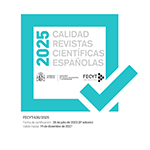Death and religion: from the old Tolstoy to the young Wittgenstein
Abstract
My purpose is twofold. Firstly, I mean to show how the question of the meaning of life and the kernel of mature Tolstoy’s religious feelings –which he conceives of as true Christianity– spring from his subjective experience of fear before death and anguish due to loneliness. These experiences lie at the core of his religiosity insofar as he derives from them the value of fraternity, which is essential to his altruistic and paradoxical humanist moral, which regards love among men as sacred and also as based on obedience to the will of God. Secondly, I will argue that Tolstoy’s religiosity as is expressed not only in The Gospel in Brief, but also in some of his literary stories which young Wittgenstein read, helped him to shape, during the years of war, a religious feeling inspired in the significance that an internalized presence of death had for the Russian writer. Now, what they may respectively understand by God’s will, to which both claim to be subject to, varies substantially. After all, Tolstoy focuses on brotherly love, while Wittgenstein emphasizes control over oneself as well as inner spiritual redemption, so that the private dimension of the religious perspective is enhanced.Downloads
Article download
License
In order to support the global exchange of knowledge, the journal Logos. Anales del Seminario de Metafísica is allowing unrestricted access to its content as from its publication in this electronic edition, and as such it is an open-access journal. The originals published in this journal are the property of the Complutense University of Madrid and any reproduction thereof in full or in part must cite the source. All content is distributed under a Creative Commons Attribution 4.0 use and distribution licence (CC BY 4.0). This circumstance must be expressly stated in these terms where necessary. You can view the summary and the complete legal text of the licence.











